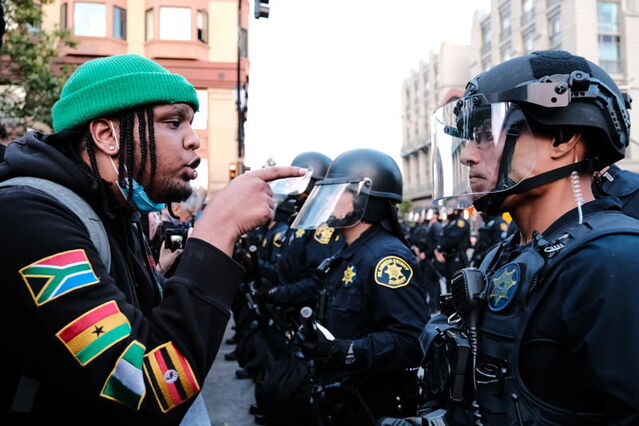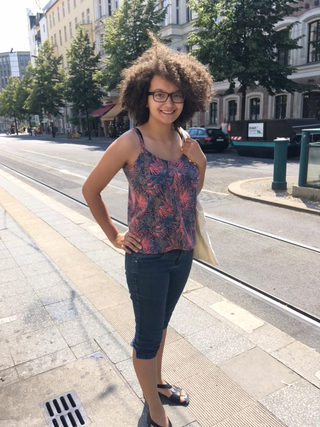Trauma
From a Black College Student in Germany: It's Traumatic
The killing of George Floyd is felt around the world.
Posted June 2, 2020
By Imani Faber, guest contributor
I'm about to fall asleep when I hear a beep from my phone. I reach over, thinking it must be Reddit or an email or a late-night text, but instead it's my news app. “I Can’t Breathe,” reads the headline. I click on the notification which brings me to the article. There's a video. It reads: “This video includes scenes of graphic violence” for a brief second before it starts. A raspy moan. A shaky video. A policeman kneeling into a Black man’s neck. Why is this happening? What is this?

I am German-American, although many would say I don’t look German. I’ve been raised in Germany by my mother and father who are both from different worlds. My mom is Black and was born in California while my father is White and was born in Germany. The first time I went to the states I learned that I am not perceived as mixed but only as Black. It doesn't matter if I am half White, I will always be seen as Black first. My mother always told me that one of the reasons she moved to Germany was because people seem to care less here about the color of her skin. I was never quite sure about that.
I am paralyzed looking at the video, and I can’t turn away. The camera zooms in. The man says it again: “Man, I can’t breathe.” I feel dizzy watching it. The policeman says: “What do you want?” The man on the ground says it again: “Man, I can’t breathe.” One of the other officers says: “Don't do drugs kids.” People gather around pleading that the officers stop. The man on the ground stops responding, and I don’t hear what they are saying anymore. I think to myself that I am watching a man die. A human life gone. Senseless. A murder right before the eyes of those who filmed it. Tears well up. My boyfriend wakes up confused. He doesn't know what to do. I begin to break down as I try to read the article through the tears in my eyes.
"How could they do that?!" I yell out between the sobs. Someone is out there thinking that they will see this man again. Someone is waiting for him to come home and now he is dead. A great sense of injustice grips my heart. And nobody could do anything to stop it. I begin to read everything I can find about what happened. But I know that there will be no reasonable answers to my question. There is only one: Racism.
I am being told not to cry. I realize I have scared the person next to me. He is a White German and doesn’t understand what it's like to be in the shoes of a Black man. He wants to be empathetic, he wants to help. But when I look into his eyes I mostly see confusion and sorrow for his own situation. He hugs me and waits for me to stop crying. Whenever I close my eyes I see the limp body of a man who I only know through a video of his death. I eventually give in to sleep.
The next morning I called my mom. The crying comes back as I tell her how I feel. “That’s why we moved to Germany, dear,” she tells me, “where these things don’t happen.”
Although I was born in NYC, I have been living across the pond for seventeen years. I have heard of police brutality against Black Americans which usually comes in small doses. A Black man shot by police, followed by how scared the policemen were or how there was somehow a misunderstanding. That always made me mad, made me worry about my own family in America, and how their Blackness would be perceived by a less-than-careful policeman. Sometimes I would see a shaky video, the sound of a gunshot, but never something like this – something so blatant, deliberate, and slow.
Seeing this video and many more over the years has almost made me numb to the psychological pain. A reminder that the color of my skin could give someone the license to treat me as less than them. For a long time I wished I could look whiter; I wished that the genes of my father were stronger. I wished that I too could look at an article about a killing and not immediately be reminded of my own family. For too long I felt like I wasn't normal. That I would always be seen as Black before I could ever be seen as a person.
And now there are protests again. People are angry. People are looting and throwing and yelling. Black and brown bodies have been falling and being shot by police for too long. I wish I could stand with them across the Atlantic. But I am stuck here watching it unfurl behind a screen. I wonder what I would have done had I seen George Floyd be killed slowly. I would have been just as helpless.

Here in Germany, only my heart can go out to the protestors, the families of the innocent lives taken, but the blood of my ancestors still courses through my veins. Just as my grandma stood up in D.C. in a time where segregation was protected by the law, my mother now stands up in Berlin in a time where Black people in America can get shot as their killers get by with a paid leave or a pink slip. Black people have been beaten down and stood upon for so long, but we are strong. We are fighting back. We are remembering the names of those so unrightfully taken. We matter.
References
Eine Analyse & Marc Pitzke. (2020, June 2). Trauma und Aufklärung. Der Spiegel (premier German news outlet).


